On-site learning experiences returned to NETL this summer, providing research associates with valuable opportunities to advance cutting-edge technologies, write papers and present their findings while collaborating with Lab’s world-class engineers and scientists.
Nearly 50 research associates participated in five internship programs designed to prepare the next generation for rewarding careers in energy-related research. Each conducted their research under the tutelage of mentors at NETL sites in Albany, Oregon; Morgantown, West Virginia; and Pittsburgh, Pennsylvania. While a small number took part remotely, most enjoyed in-person internship experiences, which is a significant change from the previous two summers when on-site participation was restricted due to COVID-19.
Each day, NETL researchers tackle the world’s most urgent energy challenges. Delivering solutions to these challenges requires expertise, creativity and innovation. It also necessitates a strong foundation of diversity and new perspectives. This summer’s research associates, which came from regions throughout the United States and its territories, provided fresh insights to explore issues and solve problems.
“If you bring together a group of people who come from different backgrounds, they will mix and present their ideas,” said Juan Flores Garcia. According to Flores Garcia, that mixture of new ideas, different problem-solving strategies and viewpoints opens the door to success. “At the end, you will have something better,” explained the mechanical engineering major who studies at the University of Puerto Rico-Mayaguez.
He and other research associates said their experiences at NETL have opened their eyes to the significance of the research undertaken at the Lab.
“The most valuable takeaways from my experience at NETL are the importance of this research for the future of the planet,” said Savanna Maynard, who will complete her undergraduate degree in chemical engineering in December. “From a sustainability perspective, we are a long way away from net-zero carbon emissions, access to adequate amounts of clean water, producing significantly less waste and resolving other environmental issues. The research done at NETL will be crucial to solving these types of problems as the world population continues to grow.”
A student at the University of Pittsburgh, Maynard said collaborating with her NETL mentor, Nicholas Siefert,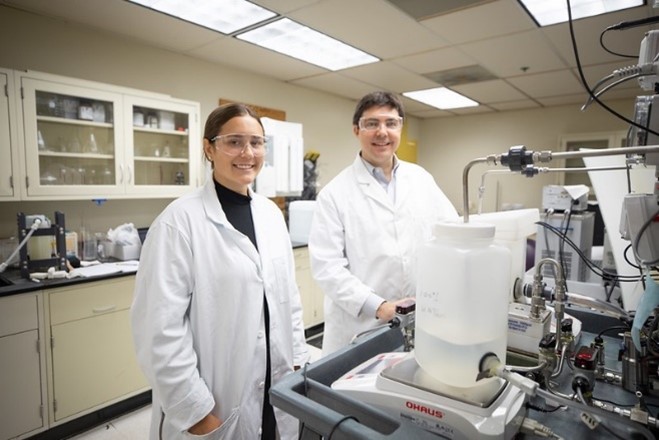 Ph.D., was especially beneficial.
Ph.D., was especially beneficial.
“The best part of collaborating with my mentor was being able to get guidance from him on the project. Dr. Siefert has been working with membranes and water treatment for several years now, and he is very knowledgeable. Also, he has been doing research for a long time, so his guidance was extremely helpful for planning experiments and data analysis,” said Maynard, whose project evaluated the induction time of silica-scale formation on membrane surfaces under varying conditions.
The research is part of an effort to develop a membrane to clean brackish water for use in power plants as an alternative to using freshwater.
Christian Maldonado-Rivera, who is studying mechanical engineering at the Polytechnic University of Puerto 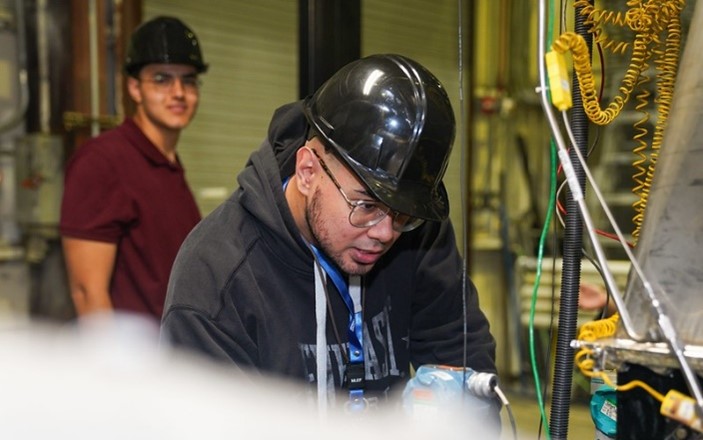 Rico, found a supportive environment at NETL where researchers and others “help you get better and won’t judge you when you feel lost. That’s important to me, feeling like I belong.”
Rico, found a supportive environment at NETL where researchers and others “help you get better and won’t judge you when you feel lost. That’s important to me, feeling like I belong.”
Maldonado-Rivera noted that his research project in NETL’s Hybrid Performance (HyPer) facility explored the development of a hybrid system composed of a solid oxide fuel cell, solid oxide electrolyzer cell, carbon capture technology and thermal energy storage to produce hydrogen and electricity.
The opportunity to see first-hand how his mentor, David Tucker, Ph.D., other engineers and scientists collaborate to achieve a common goal was inspiring. “Plus, having the experience of living in a place different from home, it helps you see the world a little bit differently and helps you get out of your comfort zone,” Maldonado-Rivera said.
University of Virginia student Olivia Wilkinson worked with NETL’s Ping Wang, Ph.D., on a project to develop mixed metal oxide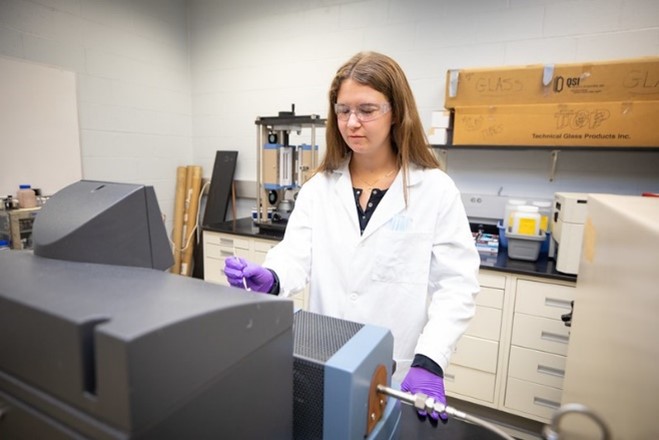 s for thermochemical energy storage. “As a current undergraduate, I am planning on attending graduate school. I am not completely sure what I want to do in the workforce, but this internship has definitely helped shape my interests toward energy efficiency,” Wilkinson said.
s for thermochemical energy storage. “As a current undergraduate, I am planning on attending graduate school. I am not completely sure what I want to do in the workforce, but this internship has definitely helped shape my interests toward energy efficiency,” Wilkinson said.
She noted that she had little research experience before serving as an NETL research associate. “I value all of the scientific work I was able to practice. I became more comfortable presenting my work, wrote my first official scientific technical paper and grew more accustomed to lab work. I hope to use all of these learning experiences in future internships, jobs and classes,” Wilkinson said.
NETL’s Scott Crawford, Ph.D., spent the summer of 2017 at NETL as a research associate. This summer, 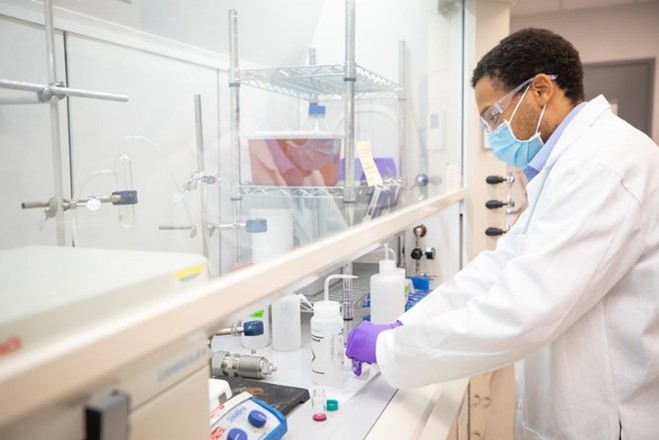 he served as a mentor for Curtis Adams, a student at Duke University pursuing a master’s degree in materials science.
he served as a mentor for Curtis Adams, a student at Duke University pursuing a master’s degree in materials science.
“I have benefitted tremendously from great role models and mentors in my professional and career development. That’s why it is important for me to give back,” Crawford said. His mentee’s project focused on the fabrication of metal-organic framework (MOF) thin films for gas and metal cation sensing. MOFs are used in many important sensing applications, including chemical sensors needed to monitor greenhouse gas emissions.
“Some valuable takeaways from my experience include getting a better idea of what research can be like in a government lab and how many distinct projects take place at these labs. I also learned a lot about metal-organic frameworks as a possible material that can be used in carbon capture, hydrogen storage and molecular sensing applications,” Adams said.
“Upon graduating with a master’s in materials science next spring, I plan to pursue an industry career in materials science. I do not have a clear idea of what exactly I want to do in this field, but I believe that working on a variety of projects associated with battery technology or decarbonization efforts would likely be my next steps,” Adams said.
Arthur Mills has had a long-standing interest in working at a national lab. “Being in the latter half of my doctorate degree, I have been curious about career opportunities at n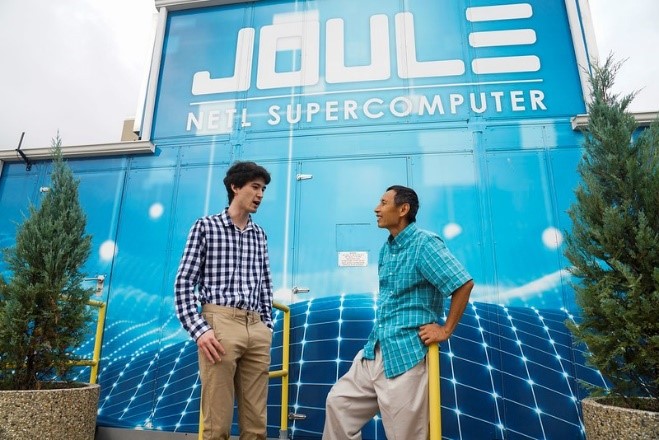 ational laboratories where I can apply my knowledge to practical problems. My experience at NETL has me excited about the prospect of working at a national laboratory in the future thanks to its collaborative environment and fascinating research,” said Mills, who attends Oregon State University.
ational laboratories where I can apply my knowledge to practical problems. My experience at NETL has me excited about the prospect of working at a national laboratory in the future thanks to its collaborative environment and fascinating research,” said Mills, who attends Oregon State University.
“My mentor (NETL’s Wu Zhang) and I were a great team in tackling our research problem (developing mathematical descriptions of objects to simulate drilling operations). It was great bouncing ideas off one another and being unafraid to challenge each other,” Mills said.
This summer, NETL welcomed research associates from five programs — The Mickey Leland Energy Fellowship, Consortium of Hybrid Resilient Energy Systems, U.S. Department of Energy Omni Technology Alliance Internship Program, Office of Energy Efficiency & Renewable Energy Advanced Manufacturing Office Energy Storage Program, and the National Science Foundation Mathematical Sciences Graduate Internship Program.
NETL drives innovation and delivers technological solutions for an environmentally sustainable and prosperous energy future. By using its world-class talent and research facilities, NETL is ensuring affordable, abundant and reliable energy that drives a robust economy and national security, while developing technologies to manage carbon across the full life cycle, enabling environmental sustainability for all Americans.




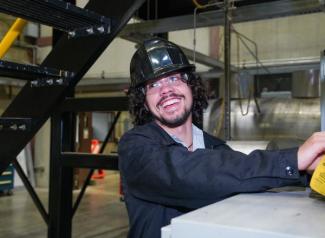
 Ph.D.,
Ph.D.,  Rico, found a supportive environment at NETL where researchers and others “help you get better and won’t judge you when you feel lost. That’s important to me, feeling like I belong.”
Rico, found a supportive environment at NETL where researchers and others “help you get better and won’t judge you when you feel lost. That’s important to me, feeling like I belong.”
 he served as a mentor for Curtis Adams, a student at Duke University pursuing a master’s degree in materials science.
he served as a mentor for Curtis Adams, a student at Duke University pursuing a master’s degree in materials science. ational laboratories where I can apply my knowledge to practical problems. My experience at NETL has me excited about the prospect of working at a national laboratory in the future thanks to its collaborative environment and fascinating research,” said Mills, who attends Oregon State University.
ational laboratories where I can apply my knowledge to practical problems. My experience at NETL has me excited about the prospect of working at a national laboratory in the future thanks to its collaborative environment and fascinating research,” said Mills, who attends Oregon State University.